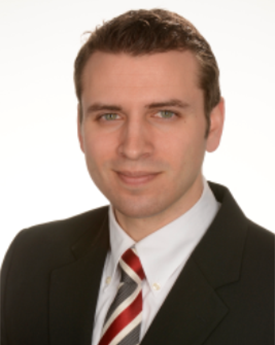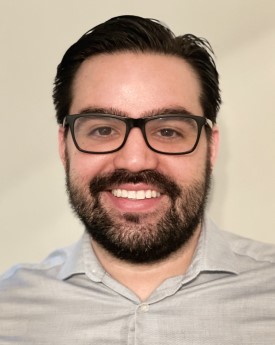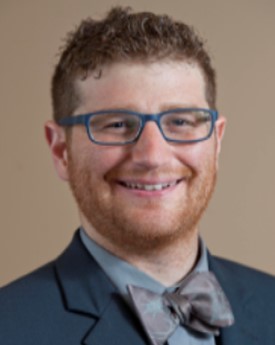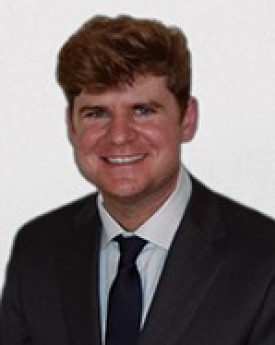Physician-Scientist Testimonials - Psychiatry Residency

Mark Kvarta, MD, PhD
2021 PSTP Graduate
Assistant Professor of Psychiatry and Physiology, University of Maryland School of Medicine
As an MD/PhD trainee graduating from the University of Maryland, I knew firsthand the strength of neuroscience research housed at the University of Maryland SOM, the key attraction that brought me here over a decade ago.
The training towards clinical excellence is only further sharpened by the unique partnership with Sheppard-Pratt Hospital as a joint residency. The formal research track in psychiatry through the PSTP has been a unique opportunity to bridge these two strengths of clinical and research distinction. The outpouring of support and enthusiasm as a research-track resident I have constantly enjoyed has been remarkable, even more so for the broad scope of clinical training taking place in tertiary, state, private and community hospitals, forensic settings, psychotherapy offices, substance abuse clinics, and emergency rooms.
I am fortunate to have developed mentorship from faculty of all interests and experience, from purely clinical to purely research and everywhere in between, extending well beyond the mentorships formally arranged. It is clear there is a shared vision to advance psychiatry through development and translation of cutting-edge neuroscience with a new generation of biological psychiatrists.
Most importantly, the mix of freedom and guidance has been seamlessly individually tailored as I develop my own personal toolbox to meet my own goal of developing into an independent translational researcher and physician-scientist.

Gustavo C. Medeiros, MD
2021 PSTP Graduate / Mood Disorders Fellow at The Johns Hopkins University School of Medicine
Prior to my fourth year I transferred to the PSTP from a similar research track residency at University of Texas Southwestern Medical Center. My experience at the University of Maryland has been very positive.
There is a strong interest in developing trainees with a research background, and the fact we have protected time for research and great support from faculty facilitates and expedites our research projects. I am working on reviews and meta-analyses and the resources available are considerable including easy access to Librarians/Informaticians, free access to systematic review software, and logistical support.
The highlight of my experience has been working with my mentor. Dr. Gould is a knowledgeable, encouraging and approachable mentor who truly wants the development of his trainees. He has an amazing research network and is very efficient in connecting us with other investigators when needed. Dr. Gould is definitely a great role model and I am sure our collaboration will continue beyond my time as a trainee at the University of Maryland.

Eric Luria Goldwaser, DO, PhD
2022 PSTP Graduate
Clinically, what was important to me in a residency program was that I would develop my interest that drew me to psychiatry initially, insight-oriented psychotherapy. My interests in research have grown from the more basic and translational neuroscience level using animal models and cell culture into human, clinical applicability.
My background work was in blood-brain barrier damage in the context of neurocognitive and neuropsychiatric disorders, namely Alzheimer's disease and post-operative delirium, which has developed into an interest in neuroimaging tools to investigate the neurovascular unit on a structural and functional level.
Since the beginning of my PGY-1 year, the level of support and encouragement as part of the PSTP has been nothing short of exceptional. Importantly, the funding for a serious research project is available and accessible, the mentorship and collaborations are rich and meaningful, and the protected time to conduct the research is real, from the start. More than anything, however, I find myself having developed a project that I am passionate about, and that I am eager to build the rest of my clinical neuroscience career on.
My goals are to develop the skills needed for a robust clinical trial assessing the neuroanatomy of behaviors, neuroimaging biomarkers of psychotherapeutic interventions, and carving out neuromodulatory circuits amenable to non-invasive assays and brain stimulation as a possible adjuvant to psychotherapy.

Andrew van der Vaart, MD, PhD
PGY-4 PSTP Resident
I became interested in the University of Maryland PSTP program because of its combined strengths in research and clinical training.
The Sheppard Pratt hospital is of world-historic significance in psychiatry, and the Maryland Psychiatric Research Center is a leader in current understanding of psychiatric neuroscience, and particularly schizophrenia.
I came to this institution with a background primarily in the neurobiology and genetics of addiction, with a dissertation on the molecular pharmacology of ethanol as it related to risk genes for Alcohol Use Disorder. During the clinical years of medical school, I became increasingly interested in the phenomenology of psychotic disorders and gained some experience in clinical psychiatry research.
I believe that the MPRC is uniquely positioned for studies in the space between basic neuroscience and clinical research. The use of human connectomic data has already shown promise and utility in identifying divergent connectivity in schizophrenia. The integration of genetic data could yield additional insights into the etiology of this abnormal connectivity, and possibly biomarkers based on conditional imaging findings, e.g. imaging markers that are predictive of disease when occurring on a background of certain sets of genetic polymorphisms.
Additionally, it may be that deeper investigations into descriptive pathology (i.e. endophenotypes) will allow for better resolution of what are potentially different subtypes of schizophrenia. I am currently working to design a project related to these questions, and to assemble the mentorship team. In my months thus far in the PSTP, I have been met with enthusiastic support from my peers and supervisors, even during my IM months.
I have also gotten the sense that the projects here are truly the residents' own, without any sense of being shuttled toward pre-designed projects (unless of course this is the resident's interest). This level of freedom is something that can be hard to even know how to seek out, but is really priceless in research training.

